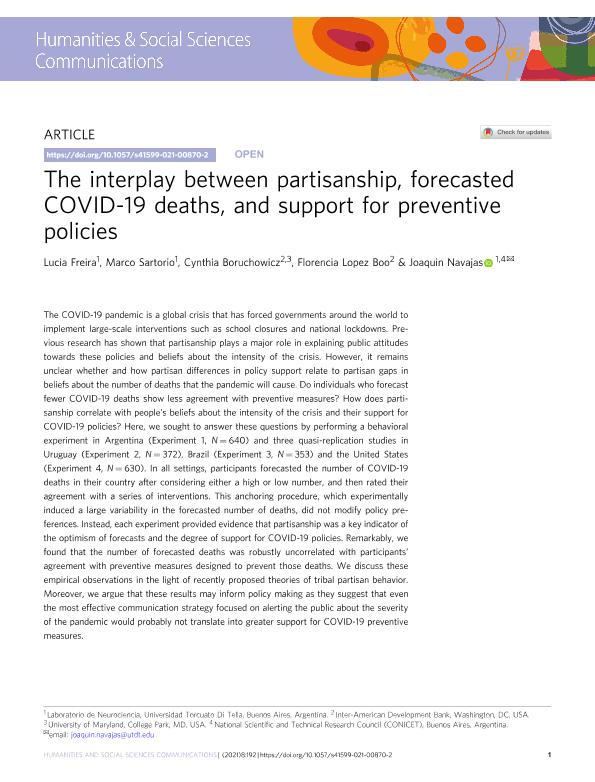Artículo
The interplay between partisanship, forecasted COVID-19 deaths, and support for preventive policies
Freira Polleri, Maria Lucia; Sartorio, Marco; Boruchowicz, Cynthia; Lopez Boo, Florencia; Navajas Ahumada, Joaquin Mariano

Fecha de publicación:
08/2021
Editorial:
Springer
Revista:
Humanities and Social Sciences Communications
ISSN:
2662-9992
Idioma:
Inglés
Tipo de recurso:
Artículo publicado
Clasificación temática:
Resumen
The COVID-19 pandemic is a global crisis that has forced governments around the world to implement large-scale interventions such as school closures and national lockdowns. Previous research has shown that partisanship plays a major role in explaining public attitudes towards these policies and beliefs about the intensity of the crisis. However, it remains unclear whether and how partisan differences in policy support relate to partisan gaps in beliefs about the number of deaths that the pandemic will cause. Do individuals who forecast fewer COVID-19 deaths show less agreement with preventive measures? How does partisanship correlate with people’s beliefs about the intensity of the crisis and their support for COVID-19 policies? Here, we sought to answer these questions by performing a behavioral experiment in Argentina (Experiment 1, N = 640) and three quasi-replication studies in Uruguay (Experiment 2, N = 372), Brazil (Experiment 3, N = 353) and the United States (Experiment 4, N = 630). In all settings, participants forecasted the number of COVID-19 deaths in their country after considering either a high or low number, and then rated their agreement with a series of interventions. This anchoring procedure, which experimentally induced a large variability in the forecasted number of deaths, did not modify policy preferences. Instead, each experiment provided evidence that partisanship was a key indicator of the optimism of forecasts and the degree of support for COVID-19 policies. Remarkably, we found that the number of forecasted deaths was robustly uncorrelated with participants’ agreement with preventive measures designed to prevent those deaths. We discuss these empirical observations in the light of recently proposed theories of tribal partisan behavior. Moreover, we argue that these results may inform policy making as they suggest that even the most effective communication strategy focused on alerting the public about the severity of the pandemic would probably not translate into greater support for COVID-19 preventive measures.
Palabras clave:
PARTISANSHIP
,
COVID-19
,
DEATHS
,
POLICIES
Archivos asociados
Licencia
Identificadores
Colecciones
Articulos(SEDE CENTRAL)
Articulos de SEDE CENTRAL
Articulos de SEDE CENTRAL
Citación
Freira Polleri, Maria Lucia; Sartorio, Marco; Boruchowicz, Cynthia; Lopez Boo, Florencia; Navajas Ahumada, Joaquin Mariano; The interplay between partisanship, forecasted COVID-19 deaths, and support for preventive policies; Springer; Humanities and Social Sciences Communications; 8; 1; 8-2021; 1-10
Compartir
Altmétricas



